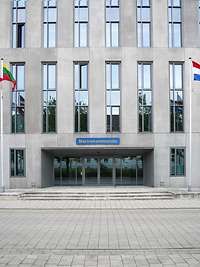
Command and Control
The Navy Headquarters is located in Rostock on Germany’s Baltic caost.


Germany’s naval forces are subdivided into three large formations as well as several commands and institutions for their support and training of personnel.

The German Navy has a special feature compared to the German Army and the Lufwaffe: its headquarters, called Navy Command, combines two command levels: corps and divisional. Both the fleet and support forces are subordinated directly to it: ships and submarines, aircraft, naval infantry and naval special forces together form the actual naval forces. The support forces take care of the Navy’s equipment, but also of its personnel development and health.
The naval schools are also directly subordinate to Navy Command. Every German sailor, marine or naval pilot has visited at least one of them during his or her career.
The Navy also has two special institutions: through a Centre of Excellence, the German Navy supports NATONorth Atlantic Treaty Organization with its expertise and experience in operations in coastal waters. And the Navy Shipping Office is a liaison office to global civil shipping.

The Navy Headquarters is located in Rostock on Germany’s Baltic caost.